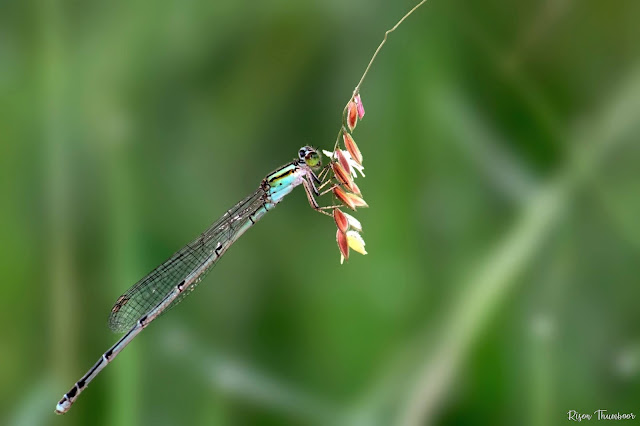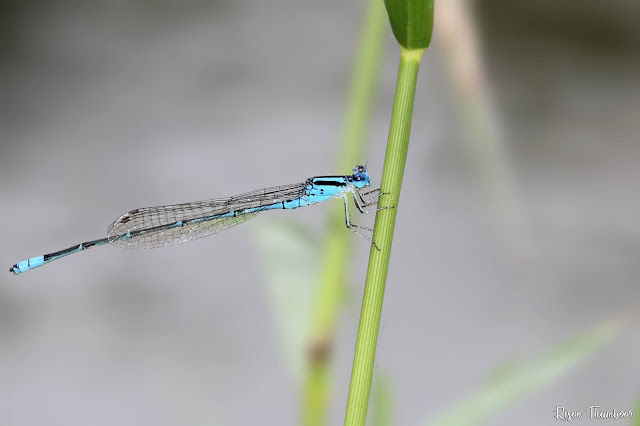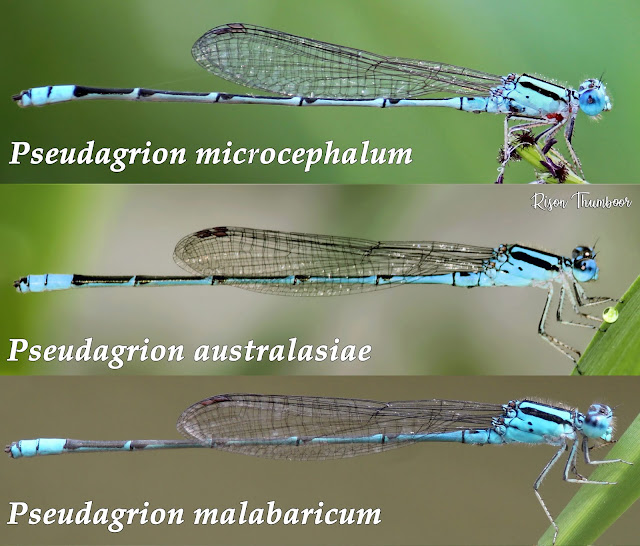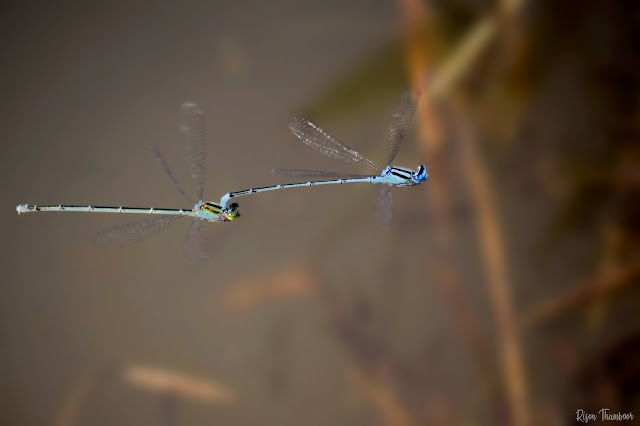Scientific name: Pseudagrion australasiae Selys, 1876
Common name: NA
Malayalam name: കുറുവാലന് പൂത്താലി.
Family: Coenagrionidae
Place of observation: Thumboor, Kerala
Date of observation: 20-11-2018
Male
Abdomen: 30 to 32.5 mm
Hind wing: 19 to 21 mm
Female
Abdomen: 29mm
Hind wing: 20mm
Wikipedia links :
https://en.wikipedia.org/wiki/Pseudagrion_australasiae
https://ml.wikipedia.org/wiki/%E0%B4%95%E0%B5%81%E0%B4%B1%E0%B5%81%E0%B4%B5%E0%B4%BE%E0%B4%B2%E0%B5%BB_%E0%B4%AA%E0%B5%82%E0%B4%A4%E0%B5%8D%E0%B4%A4%E0%B4%BE%E0%B4%B2%E0%B4%BF
Common name: NA
Malayalam name: കുറുവാലന് പൂത്താലി.
Family: Coenagrionidae
Place of observation: Thumboor, Kerala
Date of observation: 20-11-2018
Male
Abdomen: 30 to 32.5 mm
Hind wing: 19 to 21 mm
Female
Abdomen: 29mm
Hind wing: 20mm
ഒഴിവുദിനങ്ങള് എനിക്ക് വളരെ പ്രതീക്ഷ നിറഞ്ഞ ഒന്നാണ്. ആ ദിവസങ്ങളില് സുഹൃത്തിനൊപ്പം അതിരപ്പിള്ളിക്കോ മറ്റോ ഒന്ന് കറങ്ങാം. പക്ഷെ ഈ നബിദിനത്തില് അദ്ദേഹത്തിനു ഒഴിവില്ലാത്തതിനാല് വീടിനടുത്തുള്ള പാടത്തേക്കിറങ്ങാമെന്നു കരുതി. വെള്ളം വറ്റിത്തുടങ്ങിയതുകൊണ്ടു അവിടെയും നിരാശയായിരുന്നു ഫലം. തിരിച്ചു പോരുന്നതിനു മുൻപായി അല്പം മുന്നോട്ടു നടന്നു വെള്ളം വറ്റാത്ത ഒരു ചെറുകുളത്തിനടുത്തെത്തി. അതിനു ചുറ്റും സൂക്ഷ്മമായി പരതിനടക്കുമ്പോൾ വലിപ്പം കൊണ്ടും നിറം കൊണ്ടും അരുവിത്തുമ്പിയെന്നു തോന്നിപ്പിച്ച ഒന്നിനെ കണ്ടു. അരുവിത്തുമ്പികളെ ഈ സമയങ്ങളിൽ ഇവിടെ കാണാറില്ലെന്നോർത്തു. കുറച്ചുകൂടി അടുത്തുവന്നു നോക്കിയപ്പോൾ ഒരു പൂത്താലിയാണെന്നു മനസ്സിലായി. പക്ഷെ വലിപ്പക്കൂടുതലും കടുത്ത നീലനിറവും അതൊരു നാട്ടുപൂത്താലിയല്ലെന്നുള്ള നിഗമനത്തിൽ എന്നെക്കൊണ്ടെത്തിച്ചു. ഞാൻ പതിവുപോലെ എന്റെ പ്രിയ സുഹൃത്ത് ജീവനുമായി ചർച്ച ചെയ്തു നാട്ടുപൂത്താലിയല്ലെന്നുറപ്പിച്ചു. തായ്ലാന്റുകാരനായ തുമ്പിവിദഗ്ധൻ ശ്രീ. നോപ്പാഡോൺ മാക്ബനെ ചിത്രങ്ങളുമായി സമീപിക്കാൻ അദ്ദേഹം നിർദ്ദേശിച്ചു. അൽപസമയത്തിനുള്ളിൽ അത് കുറുവാലന് പൂത്താലി (Pseudagrion australasiae) യാണെന്നു അദ്ദേഹം കണ്ടെത്തി. അങ്ങനെ കേരളത്തിന്റെ സമൃദ്ധമായ തുമ്പിക്കൂട്ടത്തിലേക്കു ഒരു അതിഥികൂടി...
Identification keys (Male)
Superior anal appendages shorter than segment 10 and bifid at the apex as seen
in profile; 11 postnodals in fore-wings. Superior anal appendages shorter than segment 10; not bifid at the apex as soon in profile.
Identification keys (Female)
Dorsal markings on segments 2 and 8 very broad, extending the whole length of segments, that on 2 broads at the base. Segment 2 with a diamond- or cordate shaped subapical spot on dorsum connected finely to base and apex.
(Fraser Vol. 1 page no. 282 to 284)
Identification keys (Male)
Superior anal appendages shorter than segment 10 and bifid at the apex as seen
in profile; 11 postnodals in fore-wings. Superior anal appendages shorter than segment 10; not bifid at the apex as soon in profile.
Identification keys (Female)
Dorsal markings on segments 2 and 8 very broad, extending the whole length of segments, that on 2 broads at the base. Segment 2 with a diamond- or cordate shaped subapical spot on dorsum connected finely to base and apex.
(Fraser Vol. 1 page no. 282 to 284)
 |
| Female |
 |
| Male |
 |
| Sperm Transferring |
 |
| Mating pair - wheel position |
 |
| Comparison of the females |
 |
| Comparison of the males |
 |
| Comparison of Anal appendages |
 |
| Comparison of the male's Head & Thorax |
 |
| Comparison of the female's Head & Thorax |
 |
| Male with a bright blue colour. P.microcephalum is a pale blue colour. |
 |
| Dorsal Thorax Dorsum of thorax with three broad black bands. |
 |
| Male anal appendages Superior anal appendages only half as long as segment 10. Superior anal appendages of P. malabaricum is longer than P.australasiae |
 |
| Mating |
 |
| Ovipositing |
Wikipedia links :
https://en.wikipedia.org/wiki/Pseudagrion_australasiae
https://ml.wikipedia.org/wiki/%E0%B4%95%E0%B5%81%E0%B4%B1%E0%B5%81%E0%B4%B5%E0%B4%BE%E0%B4%B2%E0%B5%BB_%E0%B4%AA%E0%B5%82%E0%B4%A4%E0%B5%8D%E0%B4%A4%E0%B4%BE%E0%B4%B2%E0%B4%BF
No comments:
Post a Comment